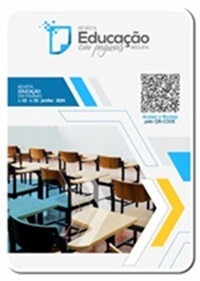Challenges of implementing online (highter) education in Mozambique
DOI:
https://doi.org/10.22481/redupa.v3.14317Keywords:
challenges, hybrid teaching, university education, MozambiqueAbstract
The study identified the challenges faced in implementing online teaching by Mozambican higher education institutions. The interest in the topic was motivated by the fact that the majority of higher education institutions in Mozambique already take on paper the implementation of hybrid teaching, which includes face-to-face and online modes, however, no major achievements in equipping equipment are envisaged and IT infrastructures. Therefore, to allow us to delve deeper into the topic highlighted, a single case study was defined, with a qualitative-quantitative approach and descriptive in nature. Semi-structured interviews, document analysis were carried out and various elements were observed as a means of data collection. They were discussed, through the triangulation of sources and the theoretical framework. The results reveal that there is a desire to implement online teaching, which is manifested on paper, however, institutions are not prepared to effectively carry out this teaching model, meaning that, although they assume on paper, in practice nothing or little happens. Thus, the challenges of implementing this teaching model are: High internet cost; internet quality (very slow); lack of IT equipment and infrastructure; poor command of technologies by both teachers and students; the institution does not have sufficient conditions to support online classes. Therefore, it is recommended that the implementation of hybrid teaching, with emphasis on online, can be done in phases and, little by little, it will be consolidated in a general way in the institution, accompanied by institutional technological development
Downloads
References
ANDRADE, Sidnei; JUNGER, Alex Paubel; AMARAL, Luiz Henrique et al. Os desafios do Ensino à Distância e do uso da Tecnologia de Informação e Comunicação. Revista de Casos e Consultoria, v. 11, n. 1, p. 1-12, 2020.
BASILIO, Felismino. O contributo da Autoavaliação na melhoria de qualidade institucional: o caso de uma universidade pública na província de Tete. Tese de doutoramento. Universidade Católica de Moçambique, Doi: 10.13140/RG.2.217349.42727, 2023.
BUENO, Ana Paula. ; RITZEL, Marcelo Iserhardt. A Informática no Contexto Educacional. Revista Conhecimento Online, v. 2, 2013.
CARVALHO, Ana Amélia. Apps para dispositivos móveis: manual para professores, formadores e bibliotecários. Portugal: Ministério da Educação, 2015. p. 1-364.
DELLOS, Ryan. Kahoot! A digital game resource for learning. International Journal of Instructional Technology And Distance Learning, v. 12, n. 4, p. 49-52, 2015.
MINISTÉRIO DA CIÊNCIA, TECNOLOGIA E ENSINO SUPERIOR. Chamada MCTES no 106/CEES/2022.
NEDER, Maria Lucia Cavalli. A formação do professor a distância: desafios e inovações na direção de uma prática transformadora. 2009.
PACIEVITCH, Thais. Tecnologia da informação e comunicação. Disponível em: <http://www.infoescola.com/informatica/tecnologia-da-informacao-e-comunicacao/>. Acesso em: 23 out. 2023.
SANTOS, Edméa. Pesquisa-formação na cibercultura [Formation-research in cyberculture]. Teresina, Brazil: Brazil EDUFPI, 2019.
DA SILVA, João Batista; DE OLIVEIRA SILVA, Diego; SALES, Gilvandenys Leite. Modelo de Ensino Híbrido: a percepção dos alunos em relação à Metodologia progressista x Metodologia tradicional. Revista Conhecimento Online , 2018, 2, p. 102-118.
SILVA, Claudinete de Jesus da. (2021) Ambientes virtuais de aprendizagem: limites e possibilidades para utilização no ensino médio virtual. RECIMA21 - Revista Científica Multidisciplinar, v.2, n.1.
TUMBO, Dionísio Luís. A Educação a Distância suportada por Tecnologias Digitais de Informação e Comunicação na Universidade Pedagógica de Moçambique: proposta de indicadores de qualidade a considerar na implementação. 2018.
Downloads
Published
How to Cite
Issue
Section
License
Copyright (c) 2024 Revista Educação em Páginas

This work is licensed under a Creative Commons Attribution 4.0 International License.






